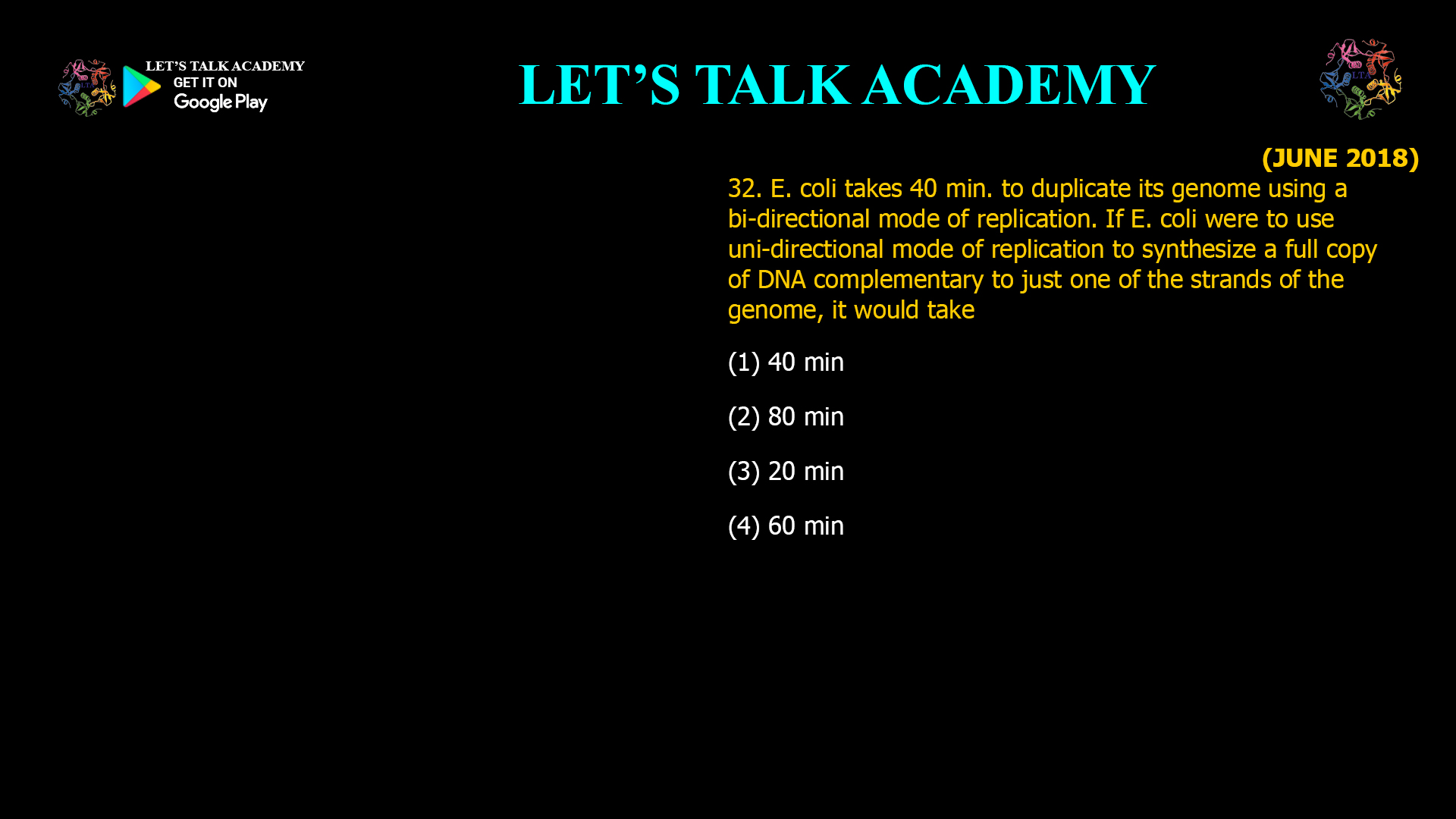- E. coli takes 40 min. to duplicate its genome using a bi-directional mode of replication. If E. coli were to use
uni-directional mode of replication to synthesize a full copy of DNA complementary to just one of the strands of the genome, it would take
(1) 40 min (2) 80 min
(3) 20 min(4) 60 min
Introduction
Escherichia coli (E. coli) is a well-studied bacterium that replicates its circular chromosome efficiently. Under normal conditions, E. coli uses bi-directional replication, initiating DNA synthesis from a single origin (oriC) and proceeding in two opposite directions simultaneously. This mechanism allows the entire genome to be duplicated in approximately 40 minutes.
However, if E. coli were to replicate its genome using a uni-directional mode—where replication proceeds in only one direction from the origin—the time required to complete replication would change significantly. This article explores why uni-directional replication would take longer and calculates the expected time based on known replication dynamics.
Bi-directional Replication in E. coli
-
Replication begins at a single origin (oriC).
-
Two replication forks move in opposite directions around the circular chromosome.
-
Each fork replicates approximately half of the genome.
-
The simultaneous progress of two forks halves the total replication time.
-
Result: Complete genome duplication in about 40 minutes.
Uni-directional Replication: What Changes?
-
Only one replication fork moves around the chromosome replicating the entire genome sequentially.
-
Since only one fork is active, it must cover the entire length of the chromosome.
-
This effectively doubles the distance the replication machinery must travel compared to bi-directional replication.
Calculating Replication Time in Uni-directional Mode
-
Given that bi-directional replication takes 40 minutes, with two forks replicating simultaneously, each fork covers half the genome in 40 minutes.
-
In uni-directional replication, a single fork must replicate the entire genome alone.
-
Therefore, the time required would be approximately 2 × 40 minutes = 80 minutes.
Summary Table
| Replication Mode | Number of Forks | Time to Complete Replication | Reason |
|---|---|---|---|
| Bi-directional | 2 | 40 minutes | Two forks replicate genome halves simultaneously |
| Uni-directional | 1 | 80 minutes | Single fork replicates entire genome sequentially |
Biological Implications
-
Bi-directional replication is an efficient strategy to speed up genome duplication, essential for rapid bacterial growth.
-
Uni-directional replication would slow down the replication process, potentially limiting growth rates.
-
The evolution of bi-directional replication likely provides a selective advantage by optimizing replication speed and cell division timing.
Correct Answer
(2) 80 minutes
Conclusion
If E. coli were to replicate its genome using uni-directional replication instead of the natural bi-directional mode, the time required to duplicate the entire chromosome would roughly double from 40 minutes to 80 minutes. This reflects the fundamental advantage of bi-directional replication in efficiently duplicating bacterial genomes.
Keywords: E. coli genome replication, bi-directional replication, uni-directional replication, replication fork, chromosome duplication time, bacterial DNA replication, replication speed, bacterial growth rate




24 Comments
Sneha Kumawat
July 29, 2025Bidirectional takes 40 mints so unidirectional 40×2 =80 mints … Directly asked from today’s notes
Surbhi Rajawat
July 29, 2025If bidirectional replication takes place in 40 min the unidirectional will take twice that is 80 minutes
Khushi Agarwal
July 29, 2025Bidirectional takes 40 min. So uni dirn takes 80 min. ….
Mansukh Kapoor
July 29, 2025The correct answer is option 2nd because in bidirectional time taken half and in unidirectional time taken is double than bidirectional
Priti Khandal
July 29, 2025Yes sir done option 2 is right 80
Priya Khandal
July 29, 202580
anurag giri
July 30, 2025Ans 2 bcoz unidirectional replication time half of bidirectional replication time
Deepika Sheoran
July 30, 2025Option 2nd is correct answer
Bidirectional takes 40minutes.so unidirectional takes 80minutes.
Because unidirectional replication time half or bidirectional replication time double.
Aafreen
July 30, 2025Bidirectional takes time 40 min
So unidirectional take twice of 40 min thats is 40×2 = 80 mins
Pratibha Sethiya
July 30, 2025Correct option is option (2)
If bidirectional takes 40 minutes than unidirectional takes 40×2 =80 minutes
Priya Dhakad
July 31, 2025Bidirectional take 40min. So unidirectional takes 80min (40×2)
shruti sharma
July 30, 2025unidirection take 80 mint
Anisha jakhar
July 30, 202580 is the answer
Diksha Chhipa
July 31, 2025Yes acc to question in unidirectional replication 80 min is required because single ori is functional and entire genome replicated by it
Anisha jakhar
July 31, 202580 min for unidirectional
Ankita Pareek
July 31, 2025If bidirectional takes 40 min to replicate the genome then unidirectional would take 80 mins
Soniya Shekhawat
July 31, 2025Bidirectional replication take place 40 min so in unidirectional single replication fork so 40×2 so 80 min.
Santosh Saini
July 31, 2025Bidirectional replication in 40 min. But when replication is unidirectional then 80 min takes
Dipti Sharma
August 1, 2025Bidirectional replication takes place in 40 min so, unidirectional will take twice that 40×2 = 80 minutes.
Khushi Vaishnav
August 1, 2025The time required to duplicate the entire chromosome would double from 40 minutes to 40×2= 80 minutes.
Dharmpal Swami
August 1, 202540×2=80 min.
Mahima Sharma
August 2, 202580
Varsha Tatla
August 3, 2025Required time would be 80min bcz in bidirectional 40min req.then in unidirectional 40×2=80min
Deepika Sheoran
November 6, 2025Bidirectional takes 40 minutes.so unidirectional takes 80 minutes.
Because unidirectional replication time half or bidirectional replication time double.